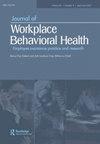Male and female witnesses of mobbing: Gender difference in experiencing consequences. A cross-sectional study in an italian sample
IF 0.8
Q3 PUBLIC, ENVIRONMENTAL & OCCUPATIONAL HEALTH
引用次数: 2
Abstract
Abstract This study aims to analyze, from a descriptive point of view, the impact of the mobbing phenomenon in male and female self-declared witnesses and the consequences that affect it. To better understand the impact of the phenomenon, a comparison was made among witnesses and non-witnesses. The hypotheses were as follows: i. witnesses are predominantly male; ii. witnesses perceived a higher risk of mobbing than non-witnesses and, as a consequence, iii. witnesses experienced more health problems and work-related stress than non-witnesses. Participants were 574 individuals (43.4% witnesses), 254 (44.3%) male and 320 (55.7%) female. They completed a questionnaire about the risk of mobbing in their organization, the perceived psychological functioning and the perceived work-related stress. Findings showed that male and female witnesses indicated the presence of verbal, physical and psychological violence that characterized the relationship within the organization, the presence of interference in individuals’ private life and/or the presence of excessive control, isolation, remittance, and deskilling that affected their colleagues more often than female non-witnesses did. About perceived health and work-related stress, findings showed that male and female witnesses perceived a higher severity level of mental health problems than non-witnesses. Results from this research could be useful in improving prevention and intervention programmes that permit possible witnesses of mobbing to understand that consequences affect not only victims but also their perceived health, increasing perceived work-related stress.围观人群的男性和女性目击者:经历后果的性别差异。意大利样本的横断面研究
摘要本研究旨在从描述性的角度分析男性和女性自述证人的围堵现象的影响及其影响后果。为了更好地理解这一现象的影响,在证人和非证人之间进行了比较。假设如下:1 .证人以男性为主;2目击证人比非目击证人认为被围攻的风险更高,因此,iii。证人比非证人经历了更多的健康问题和工作压力。参与者574人(43.4%),男性254人(44.3%),女性320人(55.7%)。他们完成了一份调查问卷,内容涉及他们所在组织中被围攻的风险、感知到的心理功能和感知到的工作压力。调查结果显示,男性和女性证人都指出,存在着作为组织内部关系特征的语言、身体和心理暴力,存在着对个人私生活的干涉和/或存在着对其同事的过度控制、孤立、汇款和去技能化,这些对其同事的影响比女性非证人更大。关于感知到的健康和工作压力,调查结果表明,男性和女性证人比非证人感知到更严重的心理健康问题。这项研究的结果可能有助于改进预防和干预方案,使可能目睹骚乱的人了解后果不仅影响受害者,还影响他们的健康,增加了他们感受到的与工作有关的压力。
本文章由计算机程序翻译,如有差异,请以英文原文为准。
求助全文
约1分钟内获得全文
求助全文
来源期刊

Journal of Workplace Behavioral Health
PUBLIC, ENVIRONMENTAL & OCCUPATIONAL HEALTH-
CiteScore
2.40
自引率
6.70%
发文量
14
期刊介绍:
The Journal of Workplace Behavioral Health, retitled from Employee Assistance Quarterly to better reflect its expanded focus, presents innovative research, applied theory, and practical information to keep workplace human service administrators, counselors, and consultants up to date on the latest developments in the field. This refereed journal is an essential guide to best practice and research issues faced by EAP professionals who deal with work-related and personal issues including workplace and family wellness, employee benefits, and organizational development.
 求助内容:
求助内容: 应助结果提醒方式:
应助结果提醒方式:


